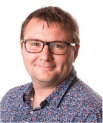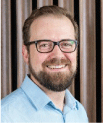New Fellows of The Australian Society for Microbiology
Assoc. Prof. Nichollas E. Scott
ARC Future Fellow and Group Leader
The Department of Microbiology and Immunology, Peter Doherty Institute, The University of Melbourne, Vic., Australia. Email: nichollas.scott@unimelb.edu.au
I have been a member of The Australian Society for Microbiology for most of my academic career, joining during my PhD at the University of Sydney (2007–2012). The ASM has been extremely important to my career development, supporting me at every step. During my PhD, the NSW branch of The ASM supported me through a James Vincent Scholarship, enabling me to travel to the University of Southern Denmark in 2008 to access instrumentation that wasn’t available in Australia at the time (an Orbitrap XL mass spectrometer). Although Orbitraps are now ubiquitous in most MS labs, at that time there weren’t any in Australia (which does make me feel old). The NSW branch also supported me to attend my first ASM meeting, the 2010 meeting in Sydney. Although I took a short break from being a member while in Canada (2012–2015), when I returned in 2016, I re-joined the society. In 2017, the ASM meeting in Hobart was the first meeting where I was invited as a speaker, which was a significant milestone as I was just about to start my independent academic career as a group leader at The University of Melbourne. I feel like The ASM has always been one of my biggest supporters, and I was blown away in 2021 when they awarded me a Frank Fenner Award. Although COVID prevented us from meeting in person that year, it was wonderful connecting with everyone again in Sydney in 2022.
Senior Research Fellow, Group Leader
Australian Centre for Ecogenomics, The University of Queensland, St Lucia, Qld 4072, Australia. Email: seweryn@uq.edu.au
For me, the journey to become a Fellow of The Australian Society for Microbiology was a circuitous and unintentional one, as my original interests lay in ecology. Immigrating to Australia was in part due to its ecology, but for very pragmatic reasons, I pursued a Masters in Clinical Microbiology. That degree resulted in nearly two decades of working in clinical microbiology, including doing a PhD on a novel virus that our lab had co-discovered. My thinking about clinical microbiology was often in the context of how those pathogens interacted with other organisms and the human body. This led to delving deeper and deeper into the human microbiome, resulting in my transition from clinical microbiology to academic research into microbial ecology and genomics. The academic transition also led to the expansion of my work into total microbiome ecology (e.g. interplay between bacteria, viruses and fungi) in the context of the host, which grew to include non-human animals. Once other animals were in the mix, it was a natural progression to become involved in One Health research, which connects environmental, animal and human health – thereby completing the loop with my original focus of clinical microbiology.
In hindsight, the diversity of topics was, rather than a lack of focus and expertise, a strength to be leveraged to make cross-disciplinary insights, and have the ability to successfully communicate, coordinate and collaborate between the specialists in each of those various disciplines. With this knowledge firmly in hand, I was happy to put my hand up to become a Fellow of The ASM, so as to add my voice and support for microbiology taken in a less-conventional way.




